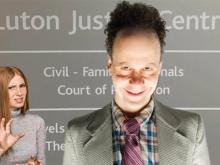
Louise and Dan. Where there's a disputed will, there's a litigation way.
A solicitor who was lambasted by a judge in court during a "bitterly contested" probate matter will not face contempt proceedings and the solicitor is now considering a libel and harassment action against one of the opposing barristers, RollOnFriday can reveal.
Private Client lawyer Daniel Curnock represented Louise Reeves in a family feud over the £100m estate of her deceased father, property tycoon Kevin Reeves.
Louise was left 80% of her father's estate in accordance with his 2014 will, with the remaining 20% going to her half-sister.
But other family members, including her brother Bill Reeves, contested the will, arguing that an earlier will of 2012 which spread the wealth more evenly across his wider family was the valid document.
Relatives claimed the wills had changed dramatically as a result of "undue influence" exerted by Reeves over her father, who died in 2019, and that he could not read and had not understood the 2014 will.
In the subsequent case, a High Court judge dismissed allegations that Louise Reeves had exerted undue influence, but he found that her father did not have "knowledge and approval" of the 2014 will, and ruled in favour of the 2012 version.
In his judgment, Mr Justice Michael Green criticised solicitor Curnock for his preparation of the 2014 will, describing him as "reckless and quite possibly dishonest".
The judge also described Curnock as a "most unsatisfactory witness" under cross-examination, and said it was "actually quite distressing" that "I cannot safely rely on the evidence from an officer of the court", noting that "There could be serious consequences for him as a result of my findings".
Following that judgment, Bill Reeves and his son Mark McKinnon made an application for permission to commence committal proceedings against Curnock and Louise Reeves, alleging that they had made false witness statements to the court.
Curnock had stated in a witness statement of December 2019 that he had met Louise Reeves for the first time only after the 2014 will was signed, but later admitted in court that he had actually met Louise Reeves in 2013. However, he denied that his original statement was knowingly false, made intentionally or recklessly, or had been intended to interfere with the administration of justice.
In her judgment regarding the application for committal proceedings, Mrs Justice Joanna Smith found that Curnock’s inaccurate statement was made years after the meeting "without access to key documents." And that a "far more likely" inference was that Curnock "as a busy practitioner" was "most unlikely to remember" an earlier meeting "absent a documentary prompt."
Mrs Justice Smith said that in her judgment, the case for contempt "does not begin to get off the ground", as the "bottom line" was that Curnock "made a single false statement of truth in his statement to the court six years after the events".
"Upon discovering that it was false, he corrected it and no longer maintained his original position", she said, while the court "was not in any way misled by the Curnock statement".
She also referred to the court hearings where Curnock's cross examination led to Mr Justice Green "making highly uncomfortable and professionally embarrassing findings" against the solicitor. She noted that Curnock's "professional reputation has already been dragged through the mud" and there was "no real public interest" in putting him through the "further ordeal" of a substantive hearing.
As a result she dismissed the application for committal proceedings against Curnock and Louise Reeves, although Bill Reeves and McKinnon have a right to apply for permission to appeal.
“I am delighted to learn that Mrs Justice Joanna Smith has concluded, on the evidence, that there is no prima facie case against me for Contempt of Court," said Daniel Curnock.
Curnock told RollOnFriday that he was currently seeking advice on a libel and harassment claim against one of the opposing barristers in the Reeves v Drew case, "for the deliberate and/or negligent submission of false and misleading information and documentation to the Court".
"I have always firmly denied any allegations of contempt of court," said the lawyer, "but I have now been allowed an opportunity to put some of the facts that I could not present to Mr Justice Green to a court, and I am pleased to have been vindicated by the Judgment."
Comments are closed for this story.

Looking for a new job: download LawyerUp from the App Store or Google Play, add a profile in 20 seconds, and get notified when leading firms and in-house employers have picked you out for a role. Accept/reject at your leisure.













